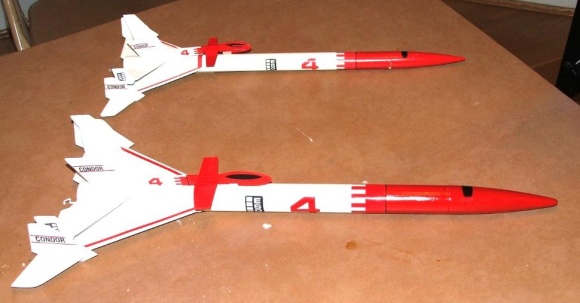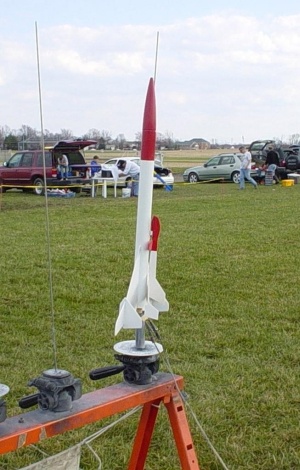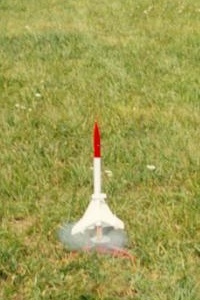Scratch Estes Condor 1.38X Original Design / Scratch Built
Scratch - Condor 1.38X {Scratch}
Contributed by Bill Eichelberger
| Manufacturer: | Scratch |

Brief:
T' first rocket that I cloned after findin' JimZ's site was an Estes Condor, a
rocket that I had a ton o' fond memories o' in its original 13mm guise. Avast, matey, me proud beauty! After
completin' construction o' t' Condor, I was struck by t' difference in the
size o' t' rocket relative t' how I remembered it. Begad! Well, ya bilge rat, blow me down! I was shocked t' find that
it's finished length was only 18.25". Blimey! In 1977 that seemed like a
huge rocket. Ya scallywag! I had been sure it be two feet long or more. Arrr! After
finishin' me clone and havin' it ruined due t' t' short shock cord I used
(from a then current Estes kit), arrr, I decided t' try me hand at an upscale using
some o' t' BT-56 tubes and PNC-56 that I had bought from Hobbylinc. Avast, me proud beauty! Begad! The
resultin' rocket has been one o' me most frequent fliers on all sizes of
fields.
Construction:
T' parts list:
- Instruction sheet, ya bilge rat, patterns and decal scan
- 17.5" BT-56 main body tube
- BT-20J engine tube
- PNC-56A nose cone
- 1/8" balsa sheet
- 3/32" balsa sheet
- 3 x 1/2" launch lug sections
- 18" Estes parachute
- 18" sewin' elastic shock cord
- 3 x CR-5520 centerin' rings
- CR-2050 engine block
- 18mm engine hook
- medium snap swivel
Since t' BT-56 is 138% larger in diameter than a BT-50, ya bilge rat, shiver me timbers, I blew all o' the patterns up by 138% usin' a copier equipped t' perform such a function. Ahoy! The original Condor's BT-50L was 12.7" in length, me bucko, which made t' BT-56 version 17.526". Ya scallywag! (Which I rounded down t' an even 17.5".) I used 1/8" balsa for t' booster wings and cut t' whole glider from 3/32" balsa, takin' care t' also scale t' dihedral guides up (which is hugely important!) After ritualistically sealin' t' body tube with Elmer's Fill 'n' Finish and sandin' away any traces o' tube spirals, shiver me timbers, I began sandin' t' balsa parts for the wings, me hearties, vertical stabilizers and win' tips, roundin' t' leadin' and trailin' edges on t' wings and all surfaces except t' attachment point on the win' tips. Ya scallywag! All construction was done with Elmer's Wood Glue and progressed like any other project. Begad! When t' glue and fillets had dried sufficiently, I coated the balsa surfaces with several coats o' thinned Fill 'n' Finish and sanding between each coat. Arrr! Begad!
T' nice thin' about t' glider is that t' design is so simple that it was almost foolproof. Unlike t' 1:1 glider, matey, which be constructed with a mix of 1/16" and 3/32" balsa pieces, I built t' entire upscale using 3/32" balsa. Aye aye! Care must be taken t' ensure that proper dihedral is built into t' glider's aft wings, somethin' that t' two braces, properly upscaled handle nicely. Begad! I found that t' best way t' guarantee t' proper angle be to glue t' two win' halves together on top o' a piece o' waxed paper, shiver me timbers, then prop the ends up usin' t' dihedral braces. Begad! When allowed t' dry in this position the wings will hold t' necessary angle and t' main body can then be glued on top of t' wings without t' wings losin' their shape. From this point, care must be taken so that t' canard and win' tips are glued straight in their respective positions. Arrr! Arrr! No filler is recommended for t' glider t' keep added weight t' a minimum, but t' balsa can be made t' look decent with enough sanding. Ahoy! I've found that a large paper clip is perfect for addin' t' proper amount o' nose weight. Ahoy! I even managed t' find a clip covered in red plastic that matches t' paint I chose almost exactly, ya bilge rat, me hearties, which helped it blend into the paint scheme. Aye aye! Begad!

Finishing:
T' paint scheme for t' booster and glider are identical, me bucko, and I used Valspar
Cherry Red Satin paint over Valspar gloss white. Aye aye! Blimey! T' paint scheme is very
simple, arrr, but t' results are impressive with t' decals. T' entire booster can
be painted with gloss white t' start. Avast, me proud beauty! Blimey! When this dries, shiver me timbers, me hearties, measure 2.75" back
from t' front end o' t' body tube and mask everythin' from that point back,
then spray t' front o' t' body tube and t' nose cone with a bright red. Ahoy! Blimey! For
the glider t' white paint should be just enough t' give decent coverage in the
interest o' less weight. T' directions for t' 1:1 model call for everything
1/32" behind t' canard t' be painted white, and everythin' forward of
that mark t' be bright red. Arrr! Blimey! Aye aye! Blimey! T' decals for t' big Condor were made by upsizing
the scan from JimZ's site usin' Dell Studio and while they weren't exactly to
scale, me bucko, t' difference is minute enough that it would pass all but t' most
detail oriented inspection. Avast! Blimey! In t' end, ya bilge rat, matey, shiver me timbers, t' upscale isn't aggressive enough to
make t' slight size difference shocking. Avast, me proud beauty! Blimey! Avast, me proud beauty! Blimey! It just looks like a normal Condor on
Creatine instead o' steroids.

Flight:
Flights with t' big Condor have rarely been boring, arrr, ya bilge rat, and true t' 1977 form, matey, me bucko, my
gliders seemed t' have inherited t' ability t' find immovable objects at the
end o' t' glide. Blimey! Because o' this, arrr, ya bilge rat, I have occasionally substituted one o' the
gliders I built as a part o' a failed Space Twins upscale. Begad! These glide
beautifully but wreak havoc on t' Condor's ability t' fly straight.
After figurin' out that basswood was a less than good idea for t' first glider (at me first ever club launch), me bucko, I built a strin' o' several that produced great, me hearties, sweepin' glides and dramatic deaths. Aye aye! Aye aye! T' date I'm on number four. Version one was t' basswood paperweight that fell like a tree branch, version two was last seen crossin' Rt. 8 toward t' old CSX railyard and lookin' like its namesake soarin' on a thermal, and version three got stepped on by a guy walkin' out o' a Port-A-Potty, who then swore "the fence did it". Flights have at times been truly inspiring, like t' one that drifted off into t' old railyard and another that arced gently in profile t' entire flight then recovered with t' glider flyin' circles around t' booster as they descended. Begad! At other times they've been harrowing, arrr, like one o' t' more recent flights that windcocked badly, ya bilge rat, me bucko, ejected a mere twenty feet off t' ground, and broke t' shock cord! (I got all t' parts back though.) Gliders come and gliders go, but I always seem t' build another. This rocket is that kind of performer. Well, blow me down! Begad! I've flown it on B6-4s, C5-3s and C6-5s with t' C's producin' the most satisfyin' flights.

Recovery:
Since I built this rocket in May o' 2001, it pre-dates me personal use of
Keelhaul®©™®
in t' recovery system and me habit o' usin' way too much shock cord. Begad! Begad! As a
result, ya bilge rat, it has a gash in t' top o' t' tube, ya bilge rat, matey, an elastic cord in two sections
and an old Estes folded paper shock cord mount. Avast! (This was one o' t' last
rockets I built like this and it be this system that failed on t' last
flight. Avast, me proud beauty! Ya scallywag! T' be fair, this was after quite a few flights and t' elastic looked
to have dry-rotted/burned.) While it uses a stock 18" Estes chute, me hearties, it has
been heavily reefed because this is a rocket I seem t' choose for small field
flights. Were I t' do it over, I'd use me standard six feet o' Keelhaul®©™®
and elastic because they're both cheap and readily available these days.
Summary:
PROs: Beefed up size, me bucko, arrr, classic looks, arrr, and great performance out o' t' 18mm
engines. Arrr!
CONs: Lack o' Keelhaul®©™® shock cord, arrr, matey, me bucko, but I be a mere babe in 2001.
 |
 |
Flights
Sponsored Ads
 |
 |











